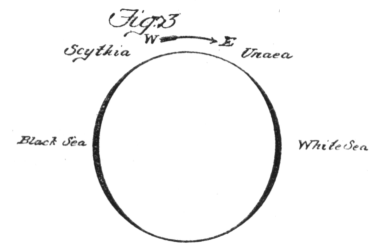
| Introduction | Contents etc. | Chapter I |
ASTRIA is a plane world, along the rim of which its inhabitants walk. "Up" is away from the centre of the disc, "down" is towards the centre. To save myself the trouble of going into anatomical details, I will represent an Astrian, diagrammatically, by means of a triangle. And it will be conducive to the clearness of the reader's imagination, if he will suppose the great sheet of matter against the surface of which Astria, its sun, and all the material bodies of that universe slip, to be disposed vertically. He will then gain a more real presentment of the feelings of motion and progression in this world.
The edge of the plane world of Astria is divided into two approximately equal portions by two oceans — the Black Sea and the White Sea. Since the daily motion of rotation of Astria takes place in the direction denoted by an arrow, the sun appears to rise over the White Sea, and the direction from the inhabited region to the White Sea is called "East."

In the earliest times the inhabited region was divided amongst two peoples, the Unæans and the Scythians. of these the Unæans were by far the more civilized. In fact, all that gave Astria the promise of becoming the gem of her planetary system, was to be found amongst the Unæans, while the Scythians led a predatory nomadic existence. Yet, versed as they were in all the arts of life, the Unæans, from the dawn of history, were gradually forced back and conquered by the Scythians.
Cesar in his history of the wars in Gaul, speaking of the provincials, says that it was their culture that made them fall before the barbaric and hardy valour of the Germans. He speaks as if civilization and culture brought of itself something debilitating and weakening to the sterner virtues. But a different reason must be assigned for the constant defeats of the Unæans, the constant ravishment of their territory, the continual absorption of a region of light into darkness by the Scythian hordes, who spared neither age nor sex, and never relinquished the land they once had gained.
I will explain the cause of the Unæans' ill success. My rough and ready representation of the inhabitants of Astria, by means of a triangle, is sufficient to enable me to describe the main features of their bodily configuration.
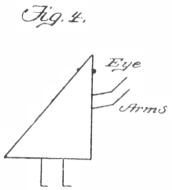
This figure of a triangle I use in a conventional way as a mark or symbol, which is simple and easy to draw, and which without any unnecessary complication enables me to make matters plain. It shows a thing I have often wondered at, namely, that there is a certain indication in the Astrian frame of being fashioned after the pattern of a higher existence rather than of complete adaptation to the exigencies of its narrow world.
Looking at the triangle which represents an Astrian, we see that on one edge are two arms and an eye, while on the other edge there exist no organs of sense or prehension. Thus, in going to the East, an Astrian could see his way clearly, and in working on anything, if it was placed to the East of him, he could operate on it conveniently; objects to the West, however, could only be seen by his bending over, and assuming a posture which, despite the suppleness of his frame, it was difficult to assume and painful to maintain for any length of time. Objects to the West also could only be reached at in a very awkward and ineffective manner.
It seems to us as if it would be an easy thing for an Astrian to turn round so that he could face in the West direction. But to do this we would have to lift the thin body of the man away from the sheet against which it slips. Such an operation is, of course, inconceivable to the inhabitants of a plane world, and their bodies would not stand such an operation, for they are far too thin to be safely turned about and even temporarily deprived of the support of the sheet on which they slip. Every man in Astria was born facing the East, and facing the East he continued till he died.
Now I believe it is evident why the Scythians evidenced such a superiority over the Unæans in warfare. The constitution of the Astrian body was such, that a Scythian man had an advantage over a Unæan man of a kind that no skill or discipline could countervail.
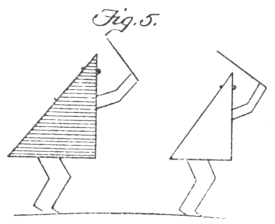
The Scythian whom I represent as a shaded figure, could both see the Unman plainly and deliver blows at him to good effect, while the Unman whom I represent as an unshaded figure, could only see the Scythian by a difficult exertion, and could only attack him or strike at him indirectly and backwards.
Thus year after year the Unmans were forced within ever narrowing boundaries, till at last, with the White Sea on one side, their irresistible foes on the other, there seemed no outcome other than final and absolute extinction.
Yet with this hopeless prospect there was no demoralization of the national character: literature and art turned to motives of a more serious nature than in times when the danger was less closely realised, and the greatest minds devoted themselves to the inculcation of a brave and stoical courage, and a religion which robbed death of its terrors.
It is easy to say in the light of after events, that the intellectual energy of the race would have been better employed in the exploration of nature, and the wresting from its secrets of more efficacious methods of warfare. But the obvious is always found by an unobvious path. Unæan history affords no exception to the rule, as the following account of their discovery how to oppose the Scythians will show.
Amongst the men of this slowly perishing race were found some who withdrew their minds from all the fears of their time, and, with a detached and impersonal interest, studied the movements of the distant stars. Thus with the Unæans, as with us, in Astronomy, Science was born. Science, that interest, that appreciation of things in and for their own sake which we are accustomed to think of as the product of a prosperous and leisured community, sprang up in Unæa, when the bulwarks of their national existence were crumbling before the savage insistent blows of their inveterate enemy.
And as with us, Science in Astronomy gave its first gift to man, giving us the art of navigation, so in Unæa Science through Astronomy gave its first gift to these mortals. But the gift did not consist merely in the facilitation of an art. It was of unparalleled splendour, nothing less than the salvation of their race. For, studying the mutations of the heavenly bodies, accounting for their vicissitudes, eclipses and disturbances, astronomers came to the great thought of the roundness of their earth. And as the news spread, as the tidings passed from one to the other that their earth was assuredly round, without any other words a great joy filled the hearts of this intelligent people. For everyone recognised without comment, that if their world was round, then a Unæan circumvading their disc would be in a position of as great advantage over a Scythian as the Scythians then had over them.
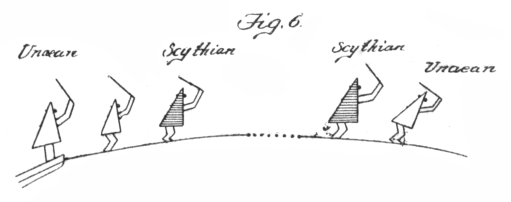
For we see that, on the right of the picture I give, we have the Scythian and Unæan in their ordinary position of combat; but on the left we see a Unæan who has circumvaded his globe, and comes on the Scythian in a position of advantage.
The prospect of meeting their hereditary foes under such reversed conditions, inspired the nation with the greatest ardour, and a period of astronomical discovery, equivalent to that which lies between the labours of Ptolemy and Newton was traversed in but few years. The Unæans surmounted the difficulties of astronomical observation which were indeed considerable.
A tube, for instance, cannot be used in Astria—there is no means by which the opposite sides can be kept together. In order to observe the transits of the heavenly bodies, it was necessary to make holes in the earth. The accompanying diagram shows a Unæan telescope—a passage into the ground surmounted by a lens. It is obvious that the astronomer must descend to his place of observation by the same channel as that through which he takes his observations. If another opening were made, as shown in the second diagram, the earth above the chamber would fall into it, there being no support to keep it in its position.
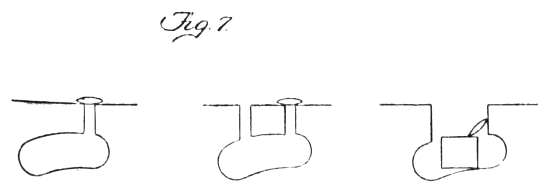
To overcome such difficulties which accompanied their mining operations, as well as their astronomical observations, the Unæans applied all the resources of their active intelligence. And before many decades had passed, after the discovery of the circularity of the earth, they had gained enough information about the phenomena of tides to predict the existence of an antipodal continent, for the rise and fall of the sea on their shore was less than that which would take place if the White and Black Seas were two limits of the same ocean.
The existence of this continent rendered an expedition to take the Scythians in the rear practicable. But, though possible, it differed in its details from any other military operation ever put into execution.
The difficulties of traversing a virgin continent were in Astria almost insuperable. In the inhabited lands all the forests had been felled and the soil was covered in summer with a springy elastic cereal, which bore its fruit in a coiled up frond. Over the resilient surface afforded by this kind of vegetation, it was possible to travel with speed and comfort. But in the primeval forest the case was different.
It is obvious that of two Astrians meeting, one would be compelled to climb over the other in order to pass him. We can imagine their condition by thinking of two tightrope walkers who, since they can diverge neither to the right or left, must pass one above or below the other. They would have the notion of right and left, although they could not make use of it; but the Astrians neither had the notion, nor if they had it could they have made use of it, all their movements being limited to such as could be executed under the conditions of their material existence, that is, of not leaving the surface of the sheet against which they slipped. If merely to pass another individual afforded this measure of difficulty, it is conceivable how great an obstacle a single tree presented to progression. It had to be surmounted as it stood, or if cut down, then as it lay, with all its tangled mass of branches.
Taking the difficulties of navigation, of the penetration into the unknown continent, the emergence therefrom, and the building of ships to traverse the Black Sea, the lowest interval of time which could elapse between the departure of the expedition and the arrival of its survivors, was estimated at one hundred and fifty years. Of those that started none could reach the goal. A part of the nation must detach itself. A band of resolute hearts, brave and bold and faithful, must be chosen for such an enterprise.
Into the incredible wastes of the forlorn antipodes must pass a chosen band. For all their lives, and for their children's children's lives, they must traverse the labyrinthine branches of a primeval forest, with nothing of all Unæa held of gracious, fair and honourable shining on them. And yet they must keep their love for her; in the hearts of unborn generations the star must rise of patriotism, keeping them faithful in the weary way, where stage by stage they bore the burden of their country's last and only hope.
The expedition started, and all Unæa bent herself with a new spirit to the task of continuing their unequal fight. They even thought of training women fighters, a thing deemed incredible before.
In speaking of the Astrians, I have previously only drawn men's figures, which are, as can be observed, all necessarily turned to the East. To represent a woman, however, it is necessary to draw a figure turned in the opposite direction, to the West.
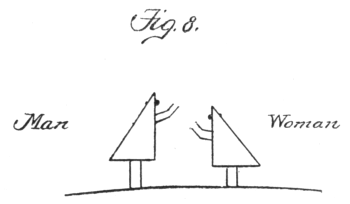
Thus a Unæan woman, if her weakness and timidity were overcome by training, would be rightly framed to resist an attack from the West. The natural responsiveness of men to women and women to men, which we notice in our world, exists in Astria to a very highly accentuated degree. There a man cannot see his friend's face, because it is necessarily turned from him, but he can watch a woman's face and note the changes of expression his words call forth. The Unæans showed great chivalry in their treatment of women, and it was handed down as one of the most terrible horrors of that last period of their war, that actually a serious proposal had been entertained of women sacrificing womanhood, of hurling women into the contest against the Scythian oppressors.
How well the trust confided to the wanderers over land and sea was borne, is a theme Unæan writers love to linger on. From those that plunged in the waste arose a race lithe, adventurous, daring, with but one thought, the thought of fair Unæa. At the resting places for exercise in arms, at the nightly camps, at the halting places where some beetling crag affronted them, ever and again the old story was told, of Unæa fair and distant waiting for them, and none the less beautiful and clear was the story, because their words grew few and the dialect of these wood wanderers differed strangely from the sweet cadence of the Unæan tongue.
The sight of the crystal waters of the sea, when their hundred-year march was at an end, came to them like the fulfilment of a prophecy. They built their ships, traversed the ocean, and attacked their hereditary foes with an impact in which was concentrated, in a single impulse of destruction, all the energy, grace, thought and aspiration of their race.
Their onslaught was irresistible. When they reached the confines of their fatherland, Scythia, as a nation, had ceased to exist.
By the advent of these, her long separated children, the terrible oppression which had always weighed on Unæa was removed. All her most energetic sons had turned to war, now they turned to the arts of peace. And with the final and absolute disappearance of any power that could contest their might, a strange vicissitude of opinion took place. By the very perfection of its success the army had prepared the way for the extinction of the estimation in which it was held.
The survivors of the adventurous band, the old heroes who had held the Scythians at bay, were rewarded with gifts of land. Then Unæa settled down to think of other things than war. It fared but ill with the majority of the old-time fighters, they were ill-fitted for business, and the alluring schemes and skilful machinations of sharper men accomplished the ruin of many. That the army should have resigned itself and become a factor of no account, have passed from absolute dominion to become the merest cypher, was due to two causes. The general who had, by the force of his native capacity for command, come to the leadership of the invaders of Scythia, was a man named Wall, characterized by an absolute and simple devotion to his country. Wall's saying, "Soldier and servant," became the watchword of the solider men of the military class. So much for the personal cause. The other reason for the quiet disappearance of militarism was the wise provision of the capitalist class, who, foreseeing the time when the struggles with labour might become acute, established as part of the constitutional institutions of their land a standing army. The function of this army was essentially merely that of a highly-organized and very efficient gendarmerie, but by establishing a high rate of pay—for the class of work involved—and by the precaution of debarring from enlistment those who came from classes likely to be disaffected to the prevailing order of things, the governing class prepared a very real safeguard against sedition.
The wisdom shown by the founders of the modern institutions of Una was amply evidenced by the subsequent course of events.
After the first period of expansion was over, the versatile and enterprising genius of the people showed itself in a rapid course of organization, and the exploitation of every possible source of advantage for the organizations formed.
The working men had organizations which embraced all the skilled labour in every pursuit. The capitalists were united in organizations which controlled the supply of every kind of natural wealth. Between these two antagonistic bodies, the smaller employers disappeared. Labour and Capital were left face to face with each other, and on the side of Capital, with its traditions for private rights, government by the best, mastery and direction of the forces of the community, stood the army, a complete protection against any attempt to set aside the constitution by force.
Class distinctions came to be founded simply on wealth. The glamour of old times, when the preservation of the national existence rested on it, had completely departed from the army—save in the traditions which lived on in the army itself.
The mass of the people looked on the soldiers as mercenaries in the pay of the capitalists, while the capitalists regarded the soldiers as one amongst the various classes of men who were willing to work for them for a moderate rate of pay. Such is an epitome of Unman history preceding the period which I have made the subject of a special study.
| Introduction | Contents etc. | Chapter I |